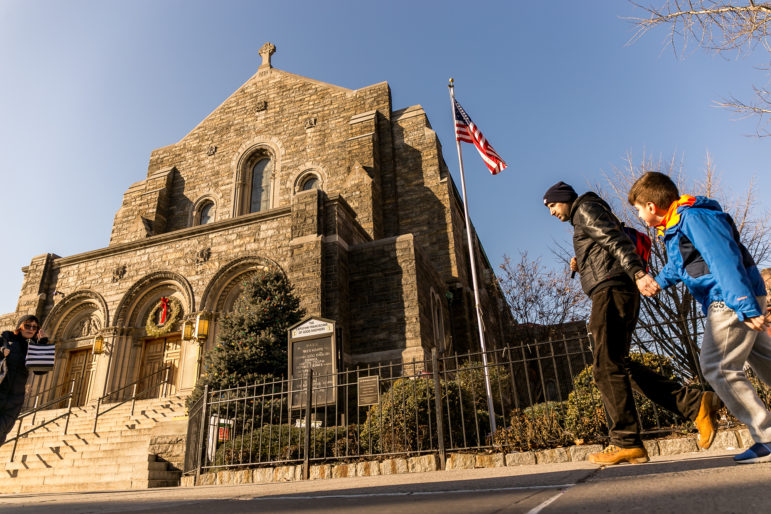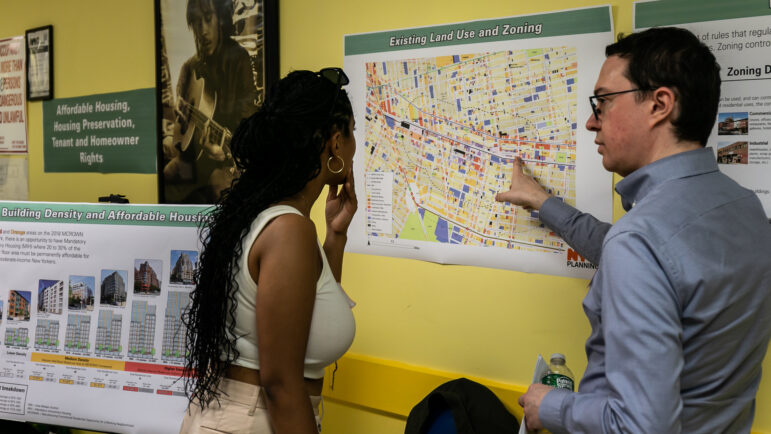“The Hope Center for College Community and Justice’s 2019 CUNY #RealCollege Survey found that 55 percent of students worry about where they will live, and 14 percent, or about 34,000 students, are unhoused.”

Michael Appleton/Mayoral Photography Office
Borough of Manhattan Community College’s (BMCC) 57th commencement ceremony at the Barclays Center in Brooklyn on Thursday, June 9, 2022.A few years back, a college professor (and husband of Senator Krueger, the co-author of this op-ed) had a student who was clearly bright and hardworking, but seemed perpetually exhausted and was struggling in the course. When he inquired what was going on, he learned the student was unhoused. That explained everything—and fortunately for that one student, he was able to intervene and help.
Getting to and through college is hard enough for anyone, but especially for students from families with limited financial means and those who are the first in their families to enroll. As it is, only two-thirds of college students graduate within six years. Of adults who were the first in their families to attend college, only 26 percent earned a bachelor’s degree. For students who are housing insecure, staying in school is much harder.
The Hope Center for College Community and Justice’s 2019 CUNY #RealCollege Survey found that 55 percent of students worry about where they will live, and 14 percent, or about 34,000 students, are unhoused. This mirrors national trends where 46 percent of students report being housing insecure and 17 percent report being unhoused.
In New York City, this problem has gone largely unaddressed until last fall, when a new pilot was launched to provide housing to New York City college students. We need to do more to meet the demand.
Neighborhood Coalition for Shelter created and launched NCS Scholars to provide year-round housing and supportive services to unhoused college students, addressing not only homelessness but also the challenges that typically cause or accompany it. The pilot is funded by private donors, including Trinity Church Wall Street Philanthropies.* More recently, the NYS legislature allocated $50,000 to the pilot.
Based in Queens, the program currently houses 23 students referred by several CUNY schools and the NYC Department of Youth and Community Development. It’s vital help for those students, but they represent only a tiny fraction of the need in New York City alone.
A student like M., a sophomore computer science major, says he would have been forced to drop out of school without the pilot. M. became unhoused when his dad moved to Texas, leaving him with no place to stay.
I., a nursing student, lived with four other relatives in a studio apartment where they took turns sleeping. She spent most of her time studying in coffee shops, libraries, and other public places with Wi-Fi access. The situation was affecting her grades and ability to stay in school.
Today, M. and I. have wrapped up a successful school year and are looking ahead to the next semester. In fact, all the students in the program have continued with their college studies, which is significantly higher than the national average persistence rate of 75 percent. Assuming they graduate, they will be substantially better off than people with no college degree. According to the New York City Comptroller, CUNY graduates with a bachelor’s degree earn nearly twice as much, or about $65,000 annually, as New Yorkers without a degree.
Programs like NCS Scholars aren’t just the right thing to do; they also make good fiscal sense. They are significantly less expensive than homeless shelters, which cost about $50,000 a year per person compared to NCS Scholars’ $30,000 per student cost.
More importantly, programs like NCS Scholars help students get on the path to long-term financial stability, which not only means a chance at a better life for them, but also reduces the likelihood that they will need to rely on safety net services in the future. Studies find that students with a bachelor’s degree are 200 times less likely to live in poverty than those with just a high school diploma.
College provides a crucial foundation for financial independence and everything that goes along with it, including better health, contributions to the community, and civic engagement. Let’s make it easier for all our young New Yorkers to succeed. We can start by ensuring they have a safe and secure place to live.
Liz Krueger, D-Manhattan, represents the 28th State Senate District. Ann Shalof is the chief executive officer of the Neighborhood Coalition for Shelter.
*Editor’s note/disclosure: Trinity Church Wall Street Philanthropies is a City Limits funder.








